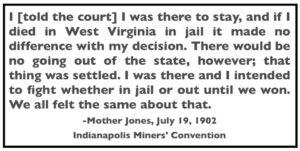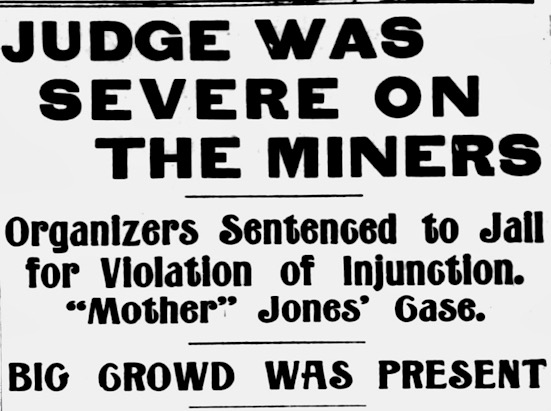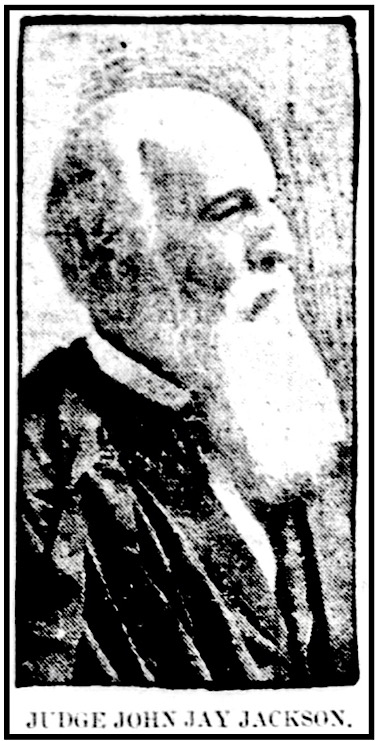 —————
—————
Hellraisers Journal – Saturday July 26, 1902
Parkersburg, West Virginia – Organizers Sentenced, Mother Jones Berated
From The Pittsburg Press of July 24, 1902:
Parkersburg, W. Va., July 24.-There was the most intense interest in the crowded room of the United States District Court this morning when Judge Jackson began reading his lengthy decision declaring “Mother” Mary Jones, the angel of the miners, and seven other organizers of the United Mine Workers and four Hungarians to be guilty of contempt of disregarding his injunction of June 19, against holding a meeting or creating a demonstration at or near the Pinnickinnick mine of the Clarksburg Fuel Co., or near the residence of miners at work. Judge Jackson, after concluding his decision, sentenced the defendants as follows:
Thomas Haggerty, 90 days in jail; Wm. Morgan, Bernard Rice, Peter Wilson, Wm. Blakeley, George Bacon, Thomas Laskavish, 60 days each. “Mother” Jones’ sentence was passed till afternoon. It is said she will receive a stiff fine and will not be jailed. Albert Repake, Joseph and George Roeski and Steve Teonike, Hungarians, passed until the afternoon session.
Judge Jackson stated that the defendants would not be sent to the same jail. District Attorney Blizzard sprung a sensation by immediately filing an affidavit that Secretary Wilson, of the United Mine Workers of America, had violated the restraining order by making an inflammatory speech at Clarksburg July 7, and at Fairmont July 8. His arrest was asked. Judge Jackson made an order that Wilson be arrested and brought within the jurisdiction of the court. Wilson is said to be in Indianapolis.
Jackson’s huge frame shook with emotion as he dramatically emphasized portions of his decision to “Mother” Jones, who was the center of attraction.
She was surrounded by the other defendants and Vice President Lewis, of the United Mine Workers. The defendants were surprised at the decision and are bitter. The miners agree that this is the most effective blow that could be struck against the men’s cause in their attempt to get out the 12,000 miners in the Fairmont coal field. The judge first reviewed in detail the bill of the coal company which led up to the order of the court and the injunction, which it was claimed was valid. Continuing he said:
The question for this court now to consider is whether or not the defendants violated its order and if so, to determine what punishment shall be imposed on them for its violation. What is an injunction? Is it the exercise of an arbitrary power by the courts of the country or is it a power that has been recognized from a very early date, as one of the branches of administrative justice? I answer this question by affirming that the ordinary use of the writ of injunction is to prevent wrongs and injuries to persons and their property or to reinstate the rights of persons to their property when they have been deprived of it. It is the most efficient, if not the only remedy, to stay irreparable injury and to punish those who disobey the order of court granting a writ. It is a mistaken idea to suppose that the courts of this country abuse this writ. In my long experience on the bench I cannot recall a single occasion where any court, either federal or State, ever abused it in what is known as strike cases.
In the case we have under consideration today the bill alleges there is a combination of persons who were known as organizers, agitators and walking delegates, who came from other States for the purpose of inducing a strike in the soft coal fields of the State of West Virginia, that their object and purpose is to induce persons who are not satisfied with the terms of their employment, and who are not asking an increase in their wages to cease work for their employers, thereby inflicting great damage and injury upon them [the employers].
It can be said that where a conspiracy exists to control the employe, as in this case, either by threats, intimidation or a resort to any other mode, usually accompanying the action of strikers, that such action on their part is not only illegal but a malicious and illegal interference with the employers’ business. The question is its best answer.
Judge Jackson said he recognized the right of laborers to combine to protect their lawful rights, and continued:
In the case we have under consideration these defendants are known as professional agitators, organizers and walking delegates. They have nothing in common with the people who are employed in the mines of the Clarksburg Fuel Co.
The evidence in the case shows that their only object is to get the people who are in the employment of the company to go out upon a strike, as it is termed, for the purpose of compelling the owners of the mine to advance an increase in their wages. The defendants in this case are not laborers in the mines and have no connection with them whatever. Their mission here is to foment trouble and create dissatisfaction among the employes in the coal mines, producing strikes, which tend greatly to damage and injure the business of the employers.
The strong arrangement of the courts of equity is invoked in this case, not to suppress the right of free speech, but to restrain and prohibit those defendants, whose only purpose is to bring about strikes by trying to coerce people who are not dissatisfied with the terms of their employment, which results in inflicting injury and damage to their employes as well as the employers.
The right of a citizen to labor for wages that he is satisfied with, is a right protected by law and is entitled to the same protection as free speech, and should be better protected than the abuse of free speech, in which the organizers and agitators indulge in trying to produce strikes.
The utterances of “Mother” Jones in her public address at or near Pinnickinnick mines on June 20, 1002, should not emanate from a citizen of this country who believes in its institutions. Such utterances are the outgrowth of the sentiments of those who believe in communism and anarchy. It is idle for this class of people to attempt to shield themselves from not only a just criticism of their principles, but from their violations of law and order by citing and relying upon the principles contained in our immortal Declaration of Independence, protecting freedom of speech. No publicist or statesman, loyal to his country, ever claimed that free speech gave the right to any one to advocate and defend treason to his country or destruction to its institutions.
The abuse of free speech inspired the anarchist and assassin to take the life of our late beloved President. May I not respectfully ask the question whether it is not time for our lawmakers, both federal and state, to consider the question whether freedom of speech should not be restricted by statutes to suppress seditious sentiments. In the case under consideration there is no adequate remedy at law, in fact, the law furnishes no satisfactory remedy against irresponsible itinerants, professional agitators, unless the powers of the court of equity are invoked.
This brings me to the question of contempt and whether or not the defendants in this case have violated the injunction of this court.
The judge cited the serving of the injunction and the holding of a meeting near the Pinnickinnick mine in violation of it. Continuing, he said:
The evidence shows that Mrs. Jones called the miners slaves and cowards; she criticised the action of the court and said she did not care anything for injunctions; that if they were arrested the jails would not hold the agitators, who would come to take their places. She advised the men to strike and stated if they would come to Illinois they would be taught how to fight and could come back and take care of themselves. She stated that the judge was a heirling of the company.
—————
[Photograph and emphasis added.]
~~~~~~~~~~~~~~~~~~~~~~~~~
SOURCES
Quote Mother Jones, Told the Court in WV to Stay, Ipl July 19, 1902, UMWC p86
https://cuomeka.wrlc.org/files/original/e8a127cff2e927a72bf17df6f97c6617.pdf
The Pittsburg Press
(Pittsburgh, Pennsylvania)
-July 24, 1902
https://www.newspapers.com/image/141914625/
IMAGE
Judge John Jay Jackson, Cnc Pst p1, July 24, 1902
https://www.newspapers.com/image/761305990
See also:
Tag: Mother Jones v Judge Jackson 1902
https://weneverforget.org/tag/mother-jones-v-judge-jackson-1902/
Tag: West Virginia Coalfield Strike of 1902-1903
https://weneverforget.org/tag/west-virginia-coalfield-strike-of-1902-1903/
~~~~~~~~~~~~~~~~~~~~~~~~~
Mother Jones, No More Deaths For Dollars – Ed Pickford


